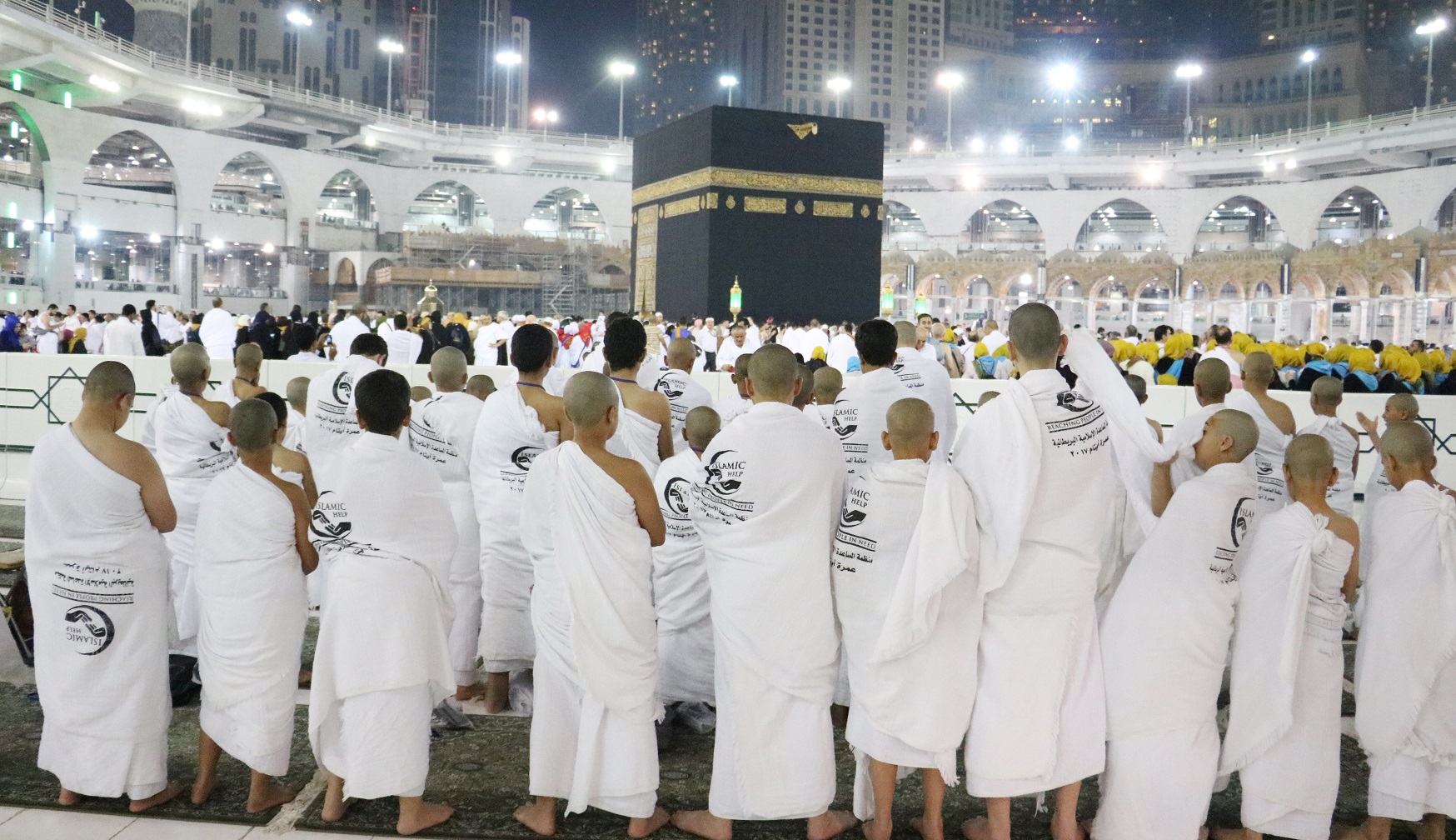A Guide To Umrah With Islamic Help
In a Hadith mentioned in the book of Ibn Maajah, the Holy Prophet (Peace Be Upon Him), said: “The performers of Hajj and Umrah are deputations of Allah Almighty. If they call Him, He answers them and if they seek His forgiveness, He forgives them”.
This month Islamic Help is taking a party of pilgrims on Umrah, and in January and February next year we will be taking between 400 to 500 Palestinian orphans on Umrah, Insha’Allah, as part of our pioneering Umrah for Orphans programme.
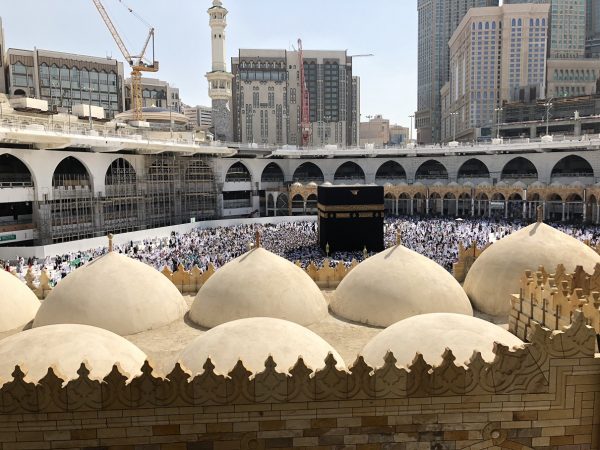
Umrah with Islamic Help, between November 12-20, is now in its second year and will see pilgrims travelling to Makkah and Madinah with some of our UK staff and Ustadh Abu Muhammad as their guide.
As well as performing the rituals of Umrah, they will also visit some of the most historically significant sites in Islam.
Since Umrah for Orphans launched in 2015, more than 2,200 Palestinian youngsters have been on this life-changing journey to the Holy Lands of Makkah and Madinah in Saudi Arabia. The pilgrims have included orphans, young girls and disabled youngsters, along with widowed mothers, from Jordan and Al Quds (Jerusalem).
But what is Umrah and what are the rituals that adult travellers and the Palestinian orphans, like any other Muslim undertaking the Umrah pilgrimage, have to go through? Here’s a brief guide.
UMRAH
In Arabic, the word Umrah means to ‘visit a place’. For Muslims, it specifically refers to the pilgrimage to Makkah.
Umrah is often referred to as the ‘minor’ Hajj. While the Hajj is one of the Five Pillars of Islam and should be performed at least once during a Muslim’s lifetime, Umrah is Sunnah – a tradition of the Prophet (PBUH) – and can be performed anytime of the year except during the five days of Hajj.
PURPOSE
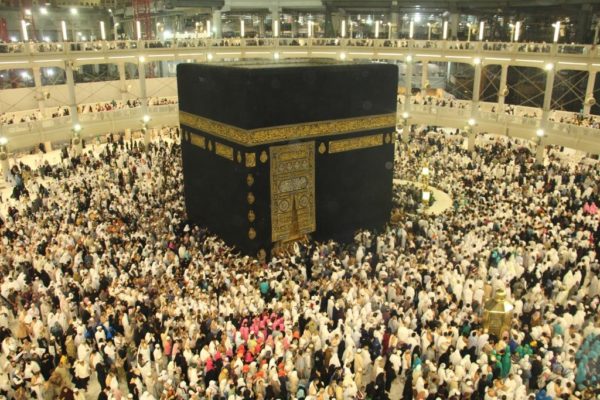
The main purpose of Umrah is to clean the soul of past sins. A Muslim can perform Umrah more than once in a lifetime.
Umrah is also seen as protection from poverty and the burdens of life, as a pilgrim is spending their wealth and time in the way of Allah.
Ibn e Masood (may Allah be pleased with him) narrated that the Prophet (PBUH) said “Follow up the Hajj and Umrah, because they certainly remove poverty and sins as fire separates the impurities from iron, gold and silver”.
TIME
Umrah can be performed at any time of the year except during the five days of Hajj. Umrah performed during the month of Ramadan is especially valued as the rewards are multiplied.
The Prophet (PBUH) said the rewards of performing Umrah during Ramadan were the equivalent of performing Hajj with him (PBUH).
IHRAM
The sacred state, of mind and body, which a Muslim has to enter to perform Umrah.
To enter the state of Ihram, pilgrims must make sure that beforehand they have cleaned their body, which includes removing hair, clipping nails, trimming moustaches and beards and having a shower (ghusl).
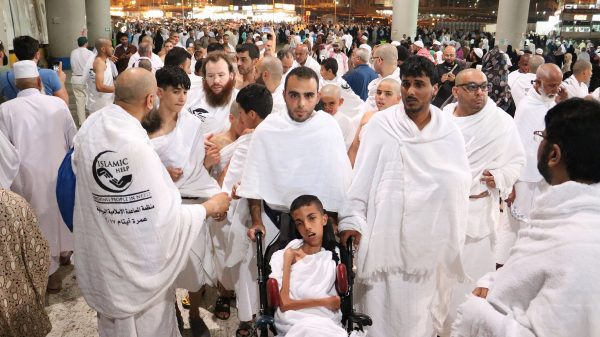
The word Ihram also refers to the clothing that pilgrims have to wear for Umrah.
Men: two sheets of unstitched white cloth that leave parts of the body – the head and face, the arms, and ankles and feet, uncovered. This means the clothing is universal in appearance and no one can be distinguished from their wealth or social status.
Women: They must wear clothing that completely conceals them except for their hands and face.
MIQAAT
An Arabic word which means ‘a stated place’. It is where those setting out for Umrah or Hajj stop over to assume the state of Ihram.
At this juncture and before they enter the holy city of Makkah, the intention to perform Umrah must be made, or already have been made, and the pilgrim will recite the Talbiyah - “Labbayk Allahumma labbayk” (Here I am at your service, O Allah here I am). Ihram begins once the Talbiyah is first recited and remains until the Umrah is completed.
DISLIKED ACTS
During the state of Ihram, pilgrims must avoid actions which could reduce the blessings and in some cases nullify the pilgrimage. Acts to be avoided during Umrah include:
• Fighting or quarrelling with others
• Cursing, swearing, talking about sinful matters and using bad language
• Wearing perfumes, using scented soaps, shampoos, lotions, wipes etc
• Cutting or removing hair or nails
• Any form of sexual activity.
TAWAF

Pilgrims first go to the holy city of Makkah and Masjid-ul-Haram, where the Ka’aba is located. Entering the Muthaaf (the area around the Ka’aba), they must perform Tawaf.
Tawaf is circling the Ka’aba seven times, anti-clockwise. Anyone performing Tawaf must first have performed wudhu (ablution) – women having their period cannot perform Tawaf until they are in a state where they can perform ghusl again.
Pilgrims should touch or kiss Hajr e Aswad (the black stone) which is in the first corner of the Ka’aba where the Tawaf starts. However, if the Muthaaf is so congested that it is not possible to do so, the Tawaf can still be completed without this act.
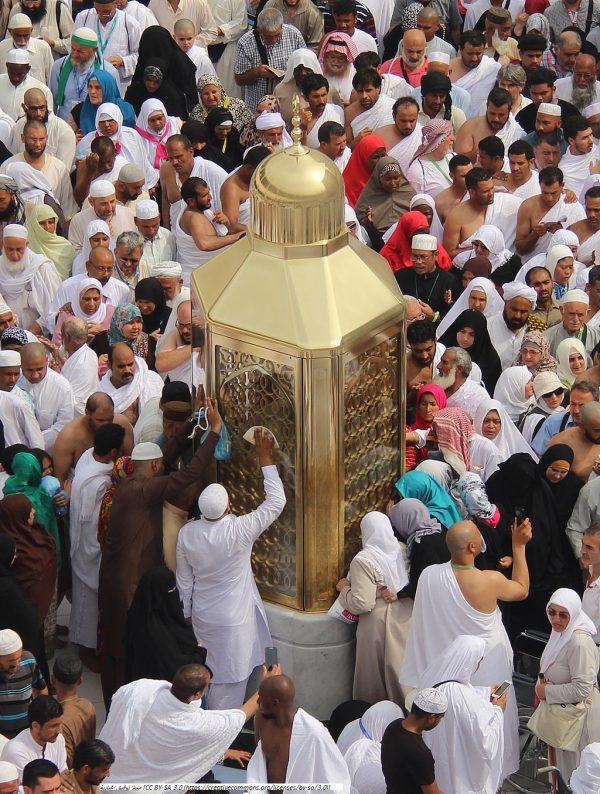
They must then pray two rakat at Maqam Ibrahim. This is the stone on which the prophet Ibrahim (alaihis salaam) stood on while building the Ka’aba, and is located in front of the doors of the Ka’aba.
Worshippers must make sure they are praying so that Maqam Ibrahim is between them and the Ka’aba (but they do not have to be directly in front of it).
In exceptionally congested periods, this prayer can be prayed anywhere in Masjid-ul-Haram.
Having completed these prayers, pilgrims must drink Zamzam water from any of the water points and then leave for Sa’ee.
SA’EE
The act of Sa’ee commemorates the actions of Hajra (alaihis salaam), the wife of Ibrahim (alaihis salaam), in which she rushed seven times between Safa and Marwah to see if she could find any water for her infant child Ismail (alaihis salaam).
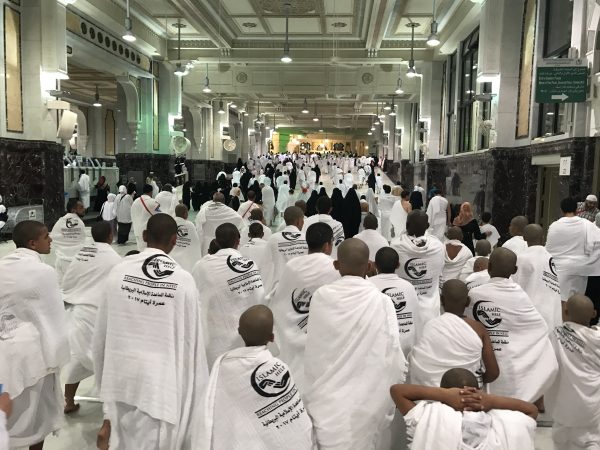
Pilgrims must perform this ritual, either running at certain points (men only) or walking as fast as they can. It is not compulsory to be in a state of wudhu to perform this act.
The Sa’ee begins at Safa and ends at Marwah. Walking from Safa to Marwah is counted as one length. Each pilgrim must complete seven of these.
Once you have reached Marwah at the end of the seventh leg, make dua and men then go to the nearby barbers’ to perform Halaq.
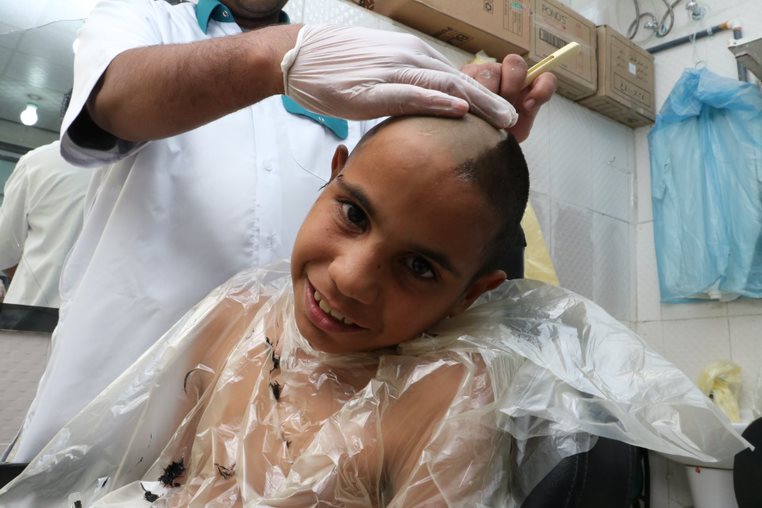
Completely shaving the head is not compulsory but is Sunnah. However, halaq means that the hair has to be cut in some form, either partly or by fully shaving the head. At this stage, women must cut an inch of their hair.
COMPLETED
Umrah is now complete! Pilgrims can now come out of the state of Ihram and revert to ‘normal’ clothing and day-to-day activities.
May Allah give us all the strength and capability to perform this blessed pilgrimage, and may He grant the duas of all those who are performing or have performed Umrah. Ameen.

